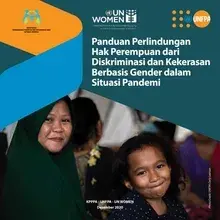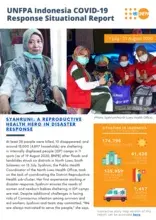INDRAMAYU, West Java, 29 June 2013: UNFPA and the Alliance of Independent Journalists (AJI) conducted media training for 12 journalists based in Jakarta and four trafficking-prone provinces - Indramayu and Cirebon (Central Java), Pontianak (West Kalimantan) and Lombok (West Nusa Tenggara).
The aim of the training was to improve journalists’ awareness of the issues around human trafficking, including the current challenges and opportunities to address this growing problem. The training sought to enhance the participants’ skills to produce news reports that are sensitive to the plight of trafficking survivors and to advocate for better policy responses and support services for survivors. Activities also included a discussion on journalistic ethics, tips and techniques for improving their reporting, and a field trip to cover trafficking.
“We want to sensitize reporters about trafficking and its interconnection with gender inequality, human rights and poverty. With improved capacity, the journalists can make meaningful contributions to favorable responses and policies for ending trafficking,” said UNFPA National Program Officer - Gender, Lany Harijanti in her opening speech.
Head of AJI Eko Maryadi said journalists can act as pressure group for improved responses by stakeholders to address trafficking. “They need skills to cover trafficking issues and must have an understanding of the survivors’ perspectives, so as to avoid double victimization of the affected women,” he explained, stressing on the need for the media to act as the voice of the voiceless.
Poverty, barriers to education, gender inequality and weak law enforcement are among the contributing factors to trafficking. Trafficking of women and children has been increasing in scale worldwide, and Indonesia is known as a source, transit, and destination country.
According to the National Agency for the Protection and Placement of Indonesian Migrant Workers (BNP2TKI), there are currently around 4.3 million Indonesians migrating abroad for work, mostly as domestic workers. Three out of four migrant workers are women. The number of undocumented (illegal) migrant workers is thought to be around 2 times higher.
Migrant Care and APIK Legal Aid have recommended several important changes to reduce trafficking, including the need to eliminate high costs associated with migration (such as health checks and training) and promote a decentralized process. Other recommendations are to provide better support for those who are abroad, and to implement an open, transparent online migration process.
Jonhar Johan from the Ministry of Women’s Empowerment and Child Protection (MOWECP) hoped that journalists could provide constructive feedback about anti-trafficking programmes from national to district level. Currently, 21 governmental agencies are working under the coordination of MWECP to address the issue from their respective mandates: prevention, protection, support and service provision and data collection. “We are open to criticisms and journalists can raise the current gaps in their news reports to draw attention and advocate for improvements. This is a big issue that cannot be solved by the government alone,” Mr. Johan said.
Ms. Harijanti added that involvement of journalists is needed because they are also members of the community. “Journalists can raise awareness on the issues, about how to get help and how to empower others to build the community’s response mechanism for improved wellbeing and welfare of their fellow members.”
Other UNFPA programmes related to addressing trafficking in Indonesia includes the establishment of an interagency response to gender based violence (GBV). The interagency response is led by the MWECP with active involvement from Ministry of Health, Ministry of Social Affairs, the Ministry of Education, and the National Police. The initiative strengthens local GBV-related services (health, psychosocial, law enforcement and legal assistance) in its 3 supported districts, namely East Lombok (West Nusa Tenggara), Indramayu (West Java), and Sambas (West Kalimantan).
This project also includes the establishment of services for comprehensive community-based prevention of GBV and human trafficking, which will include empowering key community leaders as champions, and setting up a community watch mechanism.***
Tags: gender-based violence




